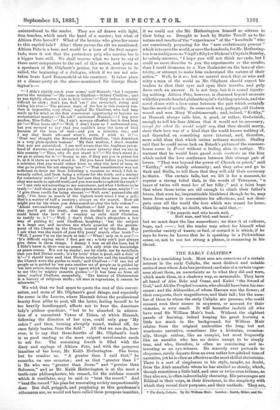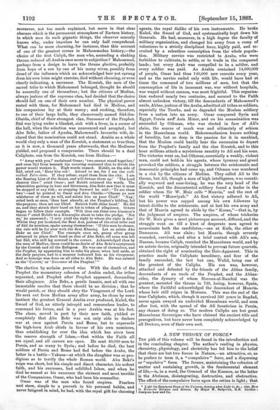THE EARLY CALIPHS.*
Tins is a nourishing book. Most men are conscious of a certain interest in the early Caliphs, the most distinct and notable series of men whom Asia has produced; and also of a certain vague- ness about them, an uncertainty as to what they, did and were, which made them, in a shadowy way, so memorable. They have all heard of Abn Bekr and Omar, and Kaled " the Sword of God," and Ali the Prophet's cousin, who should have been his suc- cessor; and the Abbassides, of whom Haroun was the flower; of their conquests, their magnificence, and their fall; but the num- ber of those to whom the early Caliphs are persons, who could recount even their names in sequence, or account for their victories, is very small. It will hereafter include all who have read Sir William Muir's book. Without the slightest parade of learning, indeed keeping his great learning a little too much in the background, Sir William Muir relates from the original authorities the long, but not wearisome narrative, sometimes like a historian, occasion- ally, though seldom, like an essayist, but most frequently like an annalist who has no desire except to be simply true, and who, therefore, is often as convincing and in- teresting as an eye-witness. He scarcely ever pretends to eloquence, rarely departs from an even rather low-pitched tone of narrative, yet he is often as effective as the most skilful rhetorician. There is a sort of simpleness in his style, caught, no doubt, from the Arab annalists whom he has studied so closely, which, though sometimes a little bald, and once or twice even tedious, as they also are, is often indescribably charming. His personages are Biblical in their ways, in their directness, in the simplicity with which they reveal their purposes, and their methods. They are, • The Early Caliphs. By Sir William Muir. London : Smith, Elder, and 0o.
moreover, not too much explained, but move in that clear obscure which is the permanent atmosphere of Eastern history, in which men do such gigantic things, the observer scarcely knows why, under impulses he can only half comprehend. What can be more charming, for instance, than this account of one of the greatest scenes in Mahommedan history,—the choice of the first Caliph, the man who, ascending a shaking throne, reduced all Arabia once more to subjection ? Mahommed, perhaps from a design to leave the throne elective, probably from hope of a son by one of his many wives, possibly from dread of the influence which an acknowledged heir not sprung from his own loins might exercise, died without choosing, or even
clearly indicating, a successor. The Koreish, the men of' the sacred tribe to which Mahommed belonged, thought he should be assuredly one of themselves ; but the citizens of Medina,
always jealous of the supreme clan, had decided that the choice should fall on one of their own number. The physical power rested with them, for Mahommed had died in Medina, and his companions lay at their mercy ; and rushing, therefore, to one of their large halls, they clamorously named Sad-ibn-
Obeida, chief of their strongest clan, Successor of the Prophet. Sid was lying under a blanket, sick with a fever, in a corner of the hall, when the selection was announced and accepted ; but
Abu Bekr, father of Ayesha, Mahommed's favourite wife, de- clared that the nomination could not stand. Arabia as a whole would obey only a man of the Koreish, a statement so true then, as it is now, a thousand years afterwards, that the Medinese yielded, and proposed a compromise. There should be a dual Caliphate, one from the Koreish, one from Medina :—
" Away with you!' exclaimed Omar; two cannot stand together;' and even Sid from beneath his covering muttered that to divide the power would weaken it. High words ensued. Hobib, on the side of Sid, cried out, Hear him not ! Attend to me, for I am the well- 'rubbed Palm-stem. If they refuse, expel them from the city. I am the Roaring Lion of the desert, and will devour them up.' The Lord destroy thee !' cried Omar; and Hobdb returned the words. The altercation gaining in heat and bitterness, Abu Bekr saw that it must be stopped at any risk ; so stepping forward he said : Ye see these two '—and he pointed to Omar and Alin Obeida—' Choose ye now whichever of them ye will, and salute him as your Chief.' Nay,' cried both at once, 'thou bast already, at the Prophet's bidding, led the prayers; thou art our Chief. Stretch forth thine band.' He did so, and they struck their hand on his in token of allegiance. Others began to follow their example. 'Wilt thou cut thine own kinsman's throat ?' cried Hobilb to a Khazrajite about to take the pledge. ' Not so he answered ; only yield the right to whom the right is duo.' Whilst they yet hesitated, the Beni Aus, jealous of the rival tribe and of Sid its nominee, spake among themselves : 'If this man be chosen, the rule will be for ever with the Beni Khazraj. Let us salute Abu Bekr as our Chief.' The example once set, group after group advanced to place their hand on that of Abu Bekr, till none was left but Sid, who still lay covered in the corner. Acknowledged thus by the men of Medina, there could be no doubt of Abu Bekr's acceptance by the Coreish and all the Refugees. He was one of themselves, and the Prophet, by appointing him to take his place, when laid aside, at the daily prayers, had in a manner indicated him as his vicegerent. And so homage was done on all sides to Abu Bekr. He was saluted -aa the ' CALIPH,' or 'Successor of the Prophet'"
The election by acclaim proved wise. With the death of the
Prophet the -momentary cohesion of Arabia ended, the tribes separated, and Prophet after Prophet appeared, demanding
their allegiance. Abu Bekr, a gentle fanatic, met all with one immutable resolve that there should be no division ; that he would perish, or they should obey the Vicegerent of the Lord. He sent out from Medina army after army, he chose by some instinct the greatest General Arabia ever produced, Kaled, the sword of God, an utterly intrepid and remorseless leader, to command his forces, and in a year Arabia was at his feet. The clans, moved in part by their new faith, yielded so completely that Abu Bekr was not only able to declare war at once against Persia and Rome, but to supersede the high-born Arab chiefs in favour of his own nominees, thus establishing for ever the idea which has since been the reserve strength of Islam,—that within the Faith all are equal, and all careers are open. He sent 40,000 men to Persia, and as many to Syria; and before he died, the best soldiers of Persia and Rome had fled before the Arabs, the latter in a battle—Yaknsa—at which the slaughter was so pro- digious as to terrify the whole Roman world. Abu Bekr's reign was short, but his simple and direct character, his ardent faith, and his successes, had solidified Islam, and when he -died he named as his successor the sternest and most terrible of the Companions, Omar, who bad been his counsellor.
Omar was of the men who found empires. Fearless and stern, simple to a proverb in his personal habits, and never fatigued in mind, he had, with the royal gift for choosing
agents, the royal dislike of his own instruments. He broke Kaled, the Sword of God, and systematically kept down his Generals. He had, moreover, in a high degree the faculty of military organisation, and changed his army from a camp of volunteers to a strictly disciplined force, highly paid, and re- cruited by a relentless conscription from the whole popula- tion. Military service was restricted to Arabs, who were forbidden to cultivate, to settle, or to trade in the conquered lands ; but every Arab was compelled to be a soldier, and every soldier was paid. As Arabia contained 14,000,000 of people, Omar had thus 140,000 new recruits every year, and as the service ended only with life, would have had at times the command of two millions of men, but that the consumption of life in incessant war, war without hospitals, war waged without cannon, was most frightful. This organisa- tion endured nearly two centuries, and secured to the Faith almost unbroken victory, till the descendants of Mahommed's uncle, Abbas, jealous of the Arabs, admitted all tribes as soldiers, especially the Toorks, and so degraded the Moslem soldiery from a cation into an army. Omar conquered Syria and Egypt, Persia and' Asia Minor, and on his assassination was succeeded by Othman, who was elected in face of Ali's claim, the source of much woe and ultimately of schism in the Mussulman world. Mahommedanism knows nothing of heredity, but so deep is the passion for it in mankind, that the Moslem could hardly bear the succession to depart from the Prophet's family and the clan Koreish, and to this hour millions attach a mysterious sanctity to All and his sons. The victories went on, but Othman, essentially a weakly, violent man, could not hold-in his agents, whose tyranny and greed provoked the soldiers, a struggle between the aristocratic and democratic principles had come up, and Othman was murdered in a riot by the citizens of Medina. They called All to the throne, but Ali, though a man of high intelligence, was essenti- ally wayward and ease-loving, he was the very head of the Koreisb, and the discontented soldiery found a leader in the soldier whom Sir W. Muir calls " Muavia," and the rest of the world " Moawiyah." At first victory adhered to Ali, but his power was sapped among his own followers by latent dislike to the aristocrats, and at last his own army and that of Muavia agreed to abide by the " Koran,"—that is, by the judgment of umpires. The umpires, of whose trickeries Sir W. Muir gives a most picturesque account, differed, and the struggle went on till a knot of desperate men agreed to assassinate both the candidates,—one at Kufa, the other at Damascus. Ali was slain ; but Maavia, though severely wounded, survived, and after a brief contest with Ali's son, Hassan, became Caliph, reunited the Mussulman world, and by an astute device, originally intended to prevent future quarrels, obtained the right of nominating the Heir-Apparent. This in practice made the Caliphate hereditary, and four of the family succeeded, the last but one, Walid, being one of the greatest of the Caliphs. His son was, however, attacked and defeated by the friends of the Abbas family, descendants of an uncle of the Prophet, and the Abbas- sides, the dynasty of whom Haronn-al-Raschid was the greatest, mounted the throne in 749, losing, however, Spain, where the Faithful acknowledged the descendant of Muavia, whose heir still reigns in Morocco. This was the end of the true Caliphate, which, though it survived 500 years in Bagdad, never again swayed an undivided Mussulman world, and soon after lost, with the spread of the Ali fanaticism in Persia, any chance of doing so. The modern Caliphs are but great Mussulman Sovereigns who have claimed the ancient title and prerogatives, but have never been completely acknowledged by all Doctors, even of their own sect.



































 Previous page
Previous page